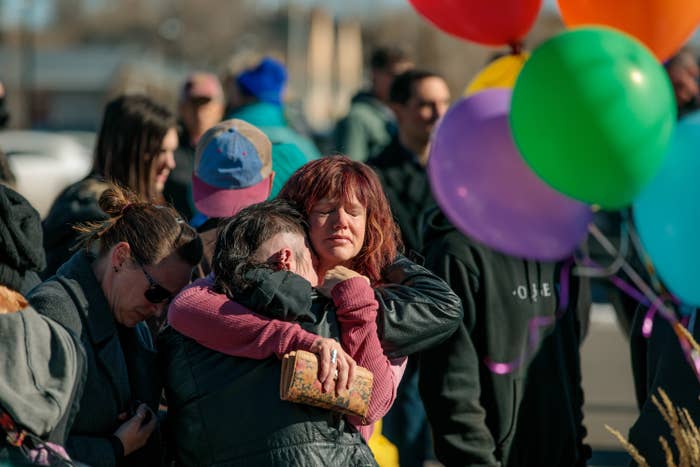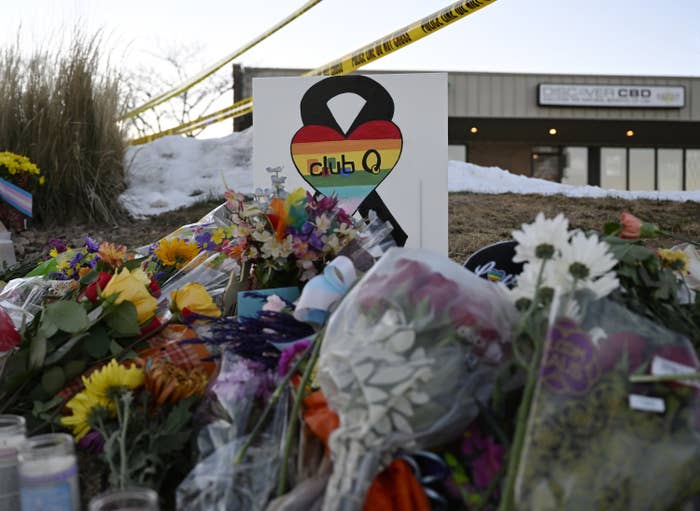
In most of the memories being shared of Colorado Springs’s gay bar Club Q, the same words are used again and again. It was a safe haven. A safe place. A sanctuary whose reputation stretched far beyond the Rocky Mountains.
“That’s usually the club that most people here in Oklahoma, when they take a trip out there, that’s where they’re recommended to go for a safe space,” Tempest Cartwright told BuzzFeed News. “A lot of people here know Club Q as being that safe haven.”
Cartwright’s best friend was Daniel Davis Aston, a Club Q bartender who was among the five people shot dead when a gunman stormed that sanctuary late Saturday night. The attack has horrified queer people across the country, but it has particularly rattled those for whom Club Q had functioned as one of the few places of rainbow refuge in a conservative corner of Colorado.
“This is a place we love, a place of peace, a place to be ourselves,” Joshua Thurman, a longtime patron who was among those who had to flee the gunfire on Saturday, told the New York Times.
In business for more than two decades, Club Q is a humble venue in a strip mall parking lot, adjacent to a Walgreens and Subway sandwich shop. It hosts late-night dancing, but also karaoke nights, bingo games, trivia competitions, and drag brunches for people of all ages, one of which was scheduled for Sunday to mark Transgender Day of Remembrance. On its Facebook page, one of the last posts before the attack was letting locals know the venue would be open on Thanksgiving for a Friendsgiving Dinner celebration for those with nowhere else to go. A place for people to call home — just like its owners wanted.

“There have been so many happy stories from Club Q,” club founder and co-owner Matthew Haynes told the Colorado Sun. “People meeting and relationships being born. So many celebrations there. We’re a family of people more than a place to have a drink and dance and leave.”
A city of almost half a million people just over an hour south of Denver, Colorado Springs has a strong conservative history. Unlike the more liberal Boulder or Denver, Colorado Springs is “staunchly Republican,” according to a 2017 Politico piece. One 2014 study found it to be the fourth most conservative city in America, ahead of places like Jacksonville, Florida; Tulsa, Oklahoma; and Fort Worth, Texas. In 2016, Colorado went for Hillary Clinton by almost five points. But in El Paso County, where Colorado Springs sits, voters favored Donald Trump by more than 23 points.
The city has been a longtime base camp for evangelical Christians opposed to LGBTQ people. Once dubbed the “Evangelical Vatican,” Colorado Springs is home to New Life Church, the influential megachurch that made headlines in 2006 when former leader Ted Haggard resigned after sleeping with and using drugs with a male sex worker. It’s also the headquarters for Focus on the Family, a group founded in the 1980s that was once described by the Southern Poverty Law Center as having been “the powerhouse of anti-gay religious organizations in America” for years before a slightly more moderate pastor took control.
In 2015, Colorado Springs was also the site of another massacre when a shooter spouting right-wing rhetoric against abortion shot up a Planned Parenthood clinic, killing three people.
In this restrictive environment, the local LGBTQ community has had no choice but to stick together.
“'It’s a very tight-knit community in Colorado Springs,” said Liss Smith, communications manager for Inside Out Youth Services, a group started in the city to support local queer young people and, as its website states, to counteract “Colorado Springs’ reputation as a city of hate.”
“So many of us know each other and support each other,” Smith told BuzzFeed News and other reporters at a virtual press conference on Monday. “There are so few spaces and so few resources that when we find those spaces and those resources, they become a lifeline.
“Colorado Springs is not always kind to our community,” Smith said.
For its staff, too, Club Q had been a place of solace. Michael Anderson, a bartender who survived the shooting, told MSNBC that before the bloodshed, Saturday had been a typical, “very fun, energetic, high-energy night” for patrons and staff.
“We come here to have community,” Anderson said, “to have a safe place to gather, to drink together, to cheers together, to have a good night.
“Last night was that,” Anderson said, “until it wasn’t.”
Clarissa-Jan Lim contributed reporting.
